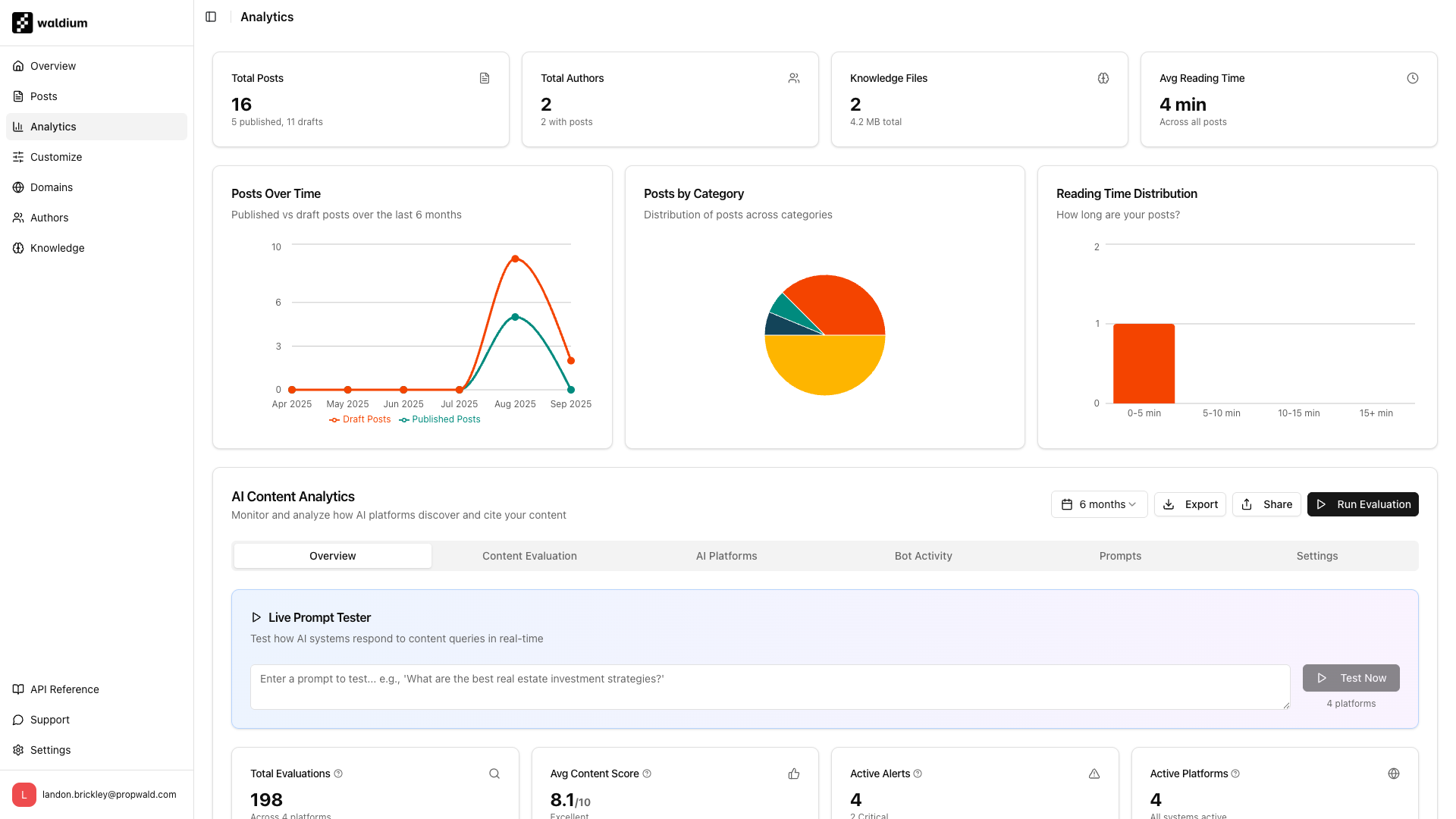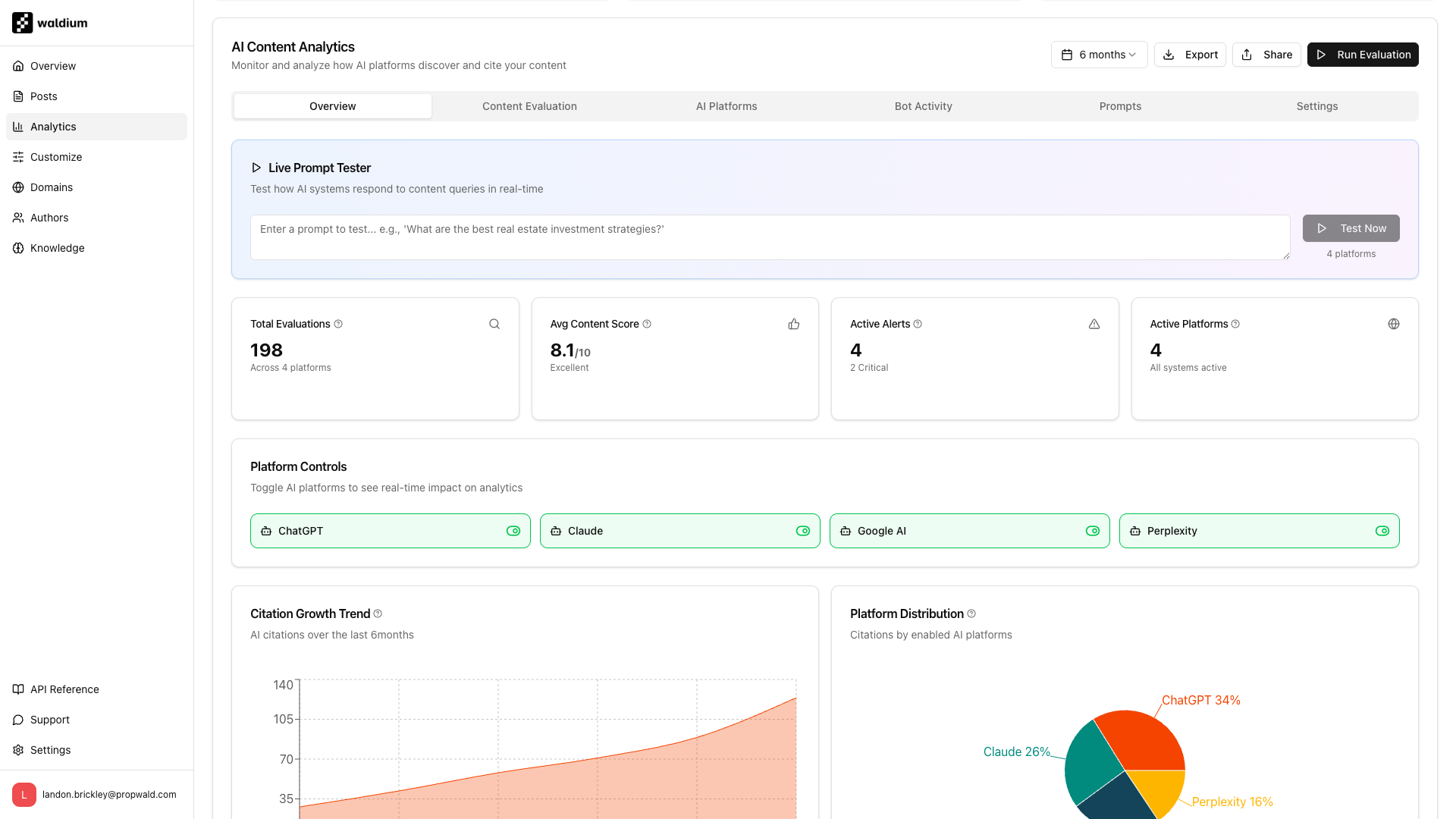llms.txt
llms.txt is a standardized file that helps AI systems understand your blog's structure and content. It's like a sitemap, but specifically designed for AI crawlers to quickly understand what you offer.
Waldium automatically generates llms.txt files for your blog, making it easier for AI systems to discover and cite your content.

What is llms.txt?
llms.txt is a plain text file that provides AI systems with a structured overview of your blog's content. Think of it as a table of contents that AI crawlers can quickly scan to understand your expertise and content areas.
What it contains:
- Content outline - All your blog posts organized by topic
- Metadata - Post titles, descriptions, and categories
- Site structure - How your content is organized
- Summary statistics - Total posts, categories, and content volume
How AI Systems Use llms.txt
Discovery Process
When AI systems crawl your site, they look for llms.txt to quickly understand your content without having to read every individual post.
The crawling workflow:
- Find llms.txt - AI systems check for
/llms.txton your domain - Parse structure - Read the outline to understand your content areas
- Identify expertise - Determine what topics you cover comprehensively
- Index content - Add your posts to their knowledge base
- Recommend - Cite your content when users ask related questions
Why It Matters
Without llms.txt, AI systems have to crawl your entire site page by page, which is slow and may miss important content. With llms.txt, they can quickly understand your expertise and prioritize your content for recommendations.
Waldium's llms.txt Implementation
Automatic Generation
Waldium automatically creates and maintains llms.txt files for your blog. You don't need to do anything - it's generated from your published content.
What gets included:
- All published posts - Every post you've published
- Post metadata - Titles, descriptions, categories, and tags
- Content structure - How posts are organized by topic
- Update frequency - When content was last updated
File Structure
Waldium generates two versions of llms.txt:
/llms.txt - Content outline and structure
DOCUMENTATION OUTLINE
===================
Property Management
==================
- Tenant Screening Best Practices (tenant-screening.md)
title: Tenant Screening Best Practices
description: Complete guide to screening tenants for rental properties
category: Property Management
- Rental Property Maintenance (maintenance.md)
title: Rental Property Maintenance
description: Essential maintenance tasks for property managers
category: Property Management
SUMMARY
=======
Total sections: 3
Total pages: 12
/llms-full.txt - Complete content for AI training
# Property Management
## Tenant Screening Best Practices
Complete guide to screening tenants for rental properties...
## Rental Property Maintenance
Essential maintenance tasks for property managers...

Technical Implementation
File Location
Your llms.txt files are automatically available at:
https://yourdomain.com/llms.txt- Content outlinehttps://yourdomain.com/llms-full.txt- Full content
Content Updates
llms.txt files are automatically updated when you:
- Publish new posts - New content is added to the outline
- Update existing posts - Changes are reflected in the full content
- Change post metadata - Titles, descriptions, and categories are updated
File Format
The files use plain text format with structured sections:
Outline format:
- Section headers with
===underlines - Post titles with file references
- Metadata indented under each post
- Summary statistics at the end
Full content format:
- Markdown-style headers
- Complete post content
- Section separators between posts
Best Practices for AI Discovery
Content Organization
Structure your content in ways that make llms.txt more effective:
Topic clustering:
- Group related posts under clear categories
- Use consistent naming conventions
- Create comprehensive coverage of topics
Metadata quality:
- Write clear, descriptive post titles
- Include detailed descriptions
- Use relevant categories and tags
Content Depth
AI systems prefer comprehensive content over thin posts:
What works:
- Complete guides - "Complete Guide to Tenant Screening"
- Detailed tutorials - "Step-by-Step Property Maintenance Checklist"
- Comprehensive comparisons - "Property Management Software: Complete Analysis"
What doesn't work:
- Short tips - "5 Quick Property Tips"
- Vague content - "Property Management Basics"
- Thin posts - Posts under 500 words
Monitoring AI Discovery
Track llms.txt Usage
Monitor how AI systems are using your llms.txt files:
Analytics to watch:
- File access - How often llms.txt is requested
- Referral traffic - Visitors from AI system recommendations
- Content citations - When AI systems cite your posts
- Search visibility - Traditional SEO metrics
Optimization
Use insights to improve your content strategy:
Based on llms.txt data:
- Popular topics - Create more content in high-demand areas
- Content gaps - Fill missing topics in your outline
- Update frequency - Keep content fresh and current